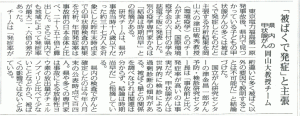Original Japanese written by staffer
The English below translated from the original Japanese by Heeday
The English translation edited by Rev. Dr. Henry French, ELCA
(Source: article of October 7th, 2015 edition of the Fukushima Minpo newspaper)
▼Click the image to enlarge it and read the caption.

A team led by Toshihide Tsuda, a professor of environmental epidemiology at Okayama University, has published the results of a study claiming that many of the thyroid cancer cases found in Fukushima Pref., after the Fukushima Daiichi disaster, are ascribable to exposure to radiation. The result is published in the e-journal, dated October 6th, of the International Society for Environmental Epidemiology. Some other experts say, however, “It is still too early to conclude such a cause-effect relation.”
Prof. Tsuda’s team analyzed thyroid examination results conducted by the end of 2014, sponsored by the prefectural government. Those examinations covered some 370,000 residents in the prefecture who were 18 years old or younger when the disaster took place. The team obtained the annual crisis rate of those samples, which is some 20 to 50 times higher than Japan’s nationwide average prior to the Fukushima Daiichi disaster. Within Fukushima Prefecture, furthermore, the crisis rate differs depending on the region, by up to 2.6 times. The team concludes: “The crisis rates of Fukushima are way greater than the national average. It is hard to ascribe such differences to any other factor than radiation.”
Actually, following the Chernobyl disaster, we discovered many health related issues only several years after the tragedy hit. Similarly, we can justly expect that a long time will be necessary before conclusions can be reached on health hazards caused by the Fukushima meltdown.
Many cases of this type of cancer have been found following the Fukushima Daiichi meltdown, and it would be very helpful to many if the causes of thyroid cancer in Fukushima’s children are identified. Are these cases ascribable to external exposure to radiation or to internal exposure caused by contaminated foods and drinks? Depending on the causes, future countermeasures can differ significantly. Possibly, some young people would be relieved from unnecessary worry if appropriate countermeasures were clarified. I am worried, however, that the longer it takes to confirm the health effects of radiation exposure, the longer it will take to identify the causes and take appropriate countermeasures
I asked the mother of a child living in Koriyama, Fukushima, what was the most serious anxiety she had recently experienced. Her reply was, “The future health of my child.” To help people protect their children’s health, I hope medics will reach a conclusion about the increase of thyroid cancer among the children of Fukushima as soon as possible, so that the causes can be identified and the right countermeasures can be developed.
